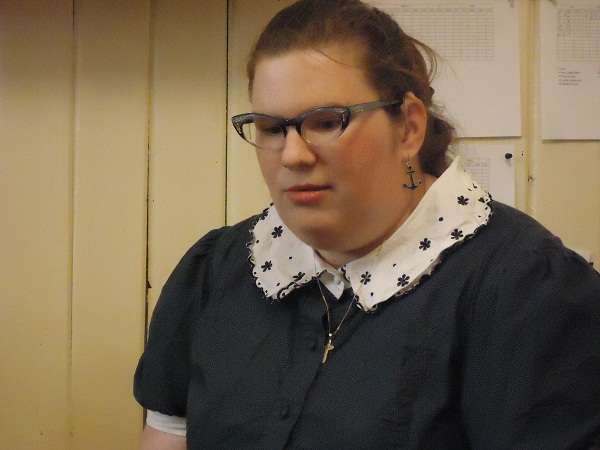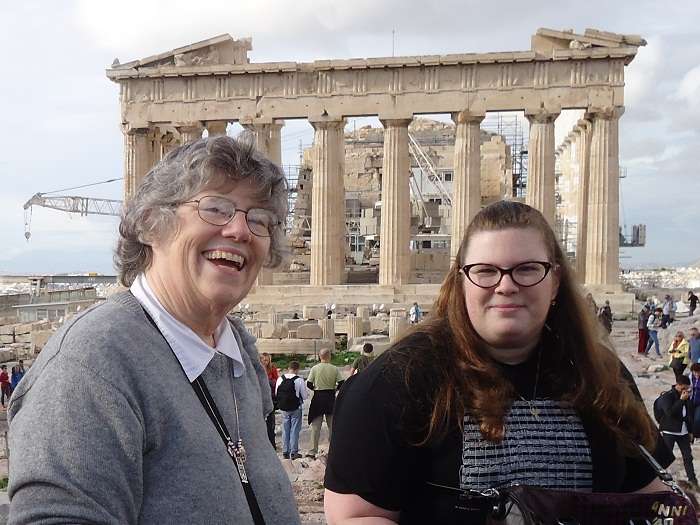Comment: How a 24-year old American and her mom showed me challenges can be overcome

 I first met Amanda, who is a volunteer at the association Invingem Autismul (defeating autism) in Bucharest, where she plays with children with autism, in the middle of February this year. When we met, she was at home, working on the computer, and sometimes playing with her dog. Amanda is American, and is currently in Romania with her mom, Anne. At 24, Amanda takes online courses and has taught herself to write screenplays. Like many of her age, she likes to go to movies and is a cinema aficionada. She would like to get a certificate in applied behavior analysis after getting a degree in film making and adopt an autistic child. In fact, she wants to adopt lots of children with other disabilities as well.
I first met Amanda, who is a volunteer at the association Invingem Autismul (defeating autism) in Bucharest, where she plays with children with autism, in the middle of February this year. When we met, she was at home, working on the computer, and sometimes playing with her dog. Amanda is American, and is currently in Romania with her mom, Anne. At 24, Amanda takes online courses and has taught herself to write screenplays. Like many of her age, she likes to go to movies and is a cinema aficionada. She would like to get a certificate in applied behavior analysis after getting a degree in film making and adopt an autistic child. In fact, she wants to adopt lots of children with other disabilities as well.
Talking to her was a big lesson in life. Amanda is autistic herself. I knew this before meeting her, and had no idea what to expect from our meeting. I had a couple of questions lined up, not knowing how it would all go. But Amanda and her mom Anne made things easier for me. Amanda has what in technical terms is called highly functional autism, is a very smart young woman, and has the ability to explain how life is for her. She in fact sometimes keeps presentations for parents of autistic children, explaining to them how it feels to be autistic. I get to hear some of that too: I was misunderstood, I knew what was going on around me, but I felt I was trapped somehow. In the middle of temper tantrums, for much of Amanda's childhood and teenage years, she did not know how to express herself and got mad as she felt the rest of the world did not understand her; she was often overloaded by sensory stimuli and changes in plans made her uneasy. Every time they went on a trip, her mom had to line up what was in store for them in the future. She wrote down what was going to happen to prepare Amanda for their trips and have her feeling comfortable. The same thing happened before coming to Romania, in October 2012.
As I listened to Amanda's story, I understood what a life must be like, not only for the child, but for the family as well, but I saw how they kept it all together and made it work. How the two women managed to overcome all obstacles and move to Romania, together with their dog – who happens to be blind and deaf from birth, and also Amanda's best friend. And I understand first hand how her mom Anne helps, and I can sense how many years of trial and error must be behind Anne's ways of dealing with Amanda. She re-phrases my questions when Amanda looks puzzled as I assumed she'd understand the hidden meaning of my question, or when I assumed she'd take it one step further and explain a bit more than what I asked. Anne is patient, she forms clear, unequivocal questions, and Amanda responds very clearly. It's a team that works, but behind it I now know there was a long, difficult road to get there. Taking care of Amanda was a full time job, and Anne had to have a regular job as well to support her. Amanda was diagnosed when she was 9. For a while she was enrolled in a special needs school, but also attended public schools. She ended up giving up on studying in the public high school, as it was a nightmare, she says. She was home schooled, took her degree and went on to take university classes online.
There was also some therapy along the way – some of which was quite costly. It all helped, and as she got older, Amanda learned to cope with changes and with challenges. However, until a year ago, they would have probably not been able to come to Romania, as Amanda still had plenty of challenges, her mother says. Even now, Anne knows sometimes Amanda will get bored easily and that it is harder for her to make friends, or stay in touch with her friends from back home, who are also autistic, so she tries to encourage her to maintain connections.
In Romania, much of what Amanda and Anne have managed to accomplish would be practically impossible. There are very few centers dealing with autism – although knowledge about autism has increased during recent years – special needs schools are a dream, and there are very few specialists for dealing with the condition. The state does not cover the costs of treatment, and on top of everything, autism is heavily under – diagnosed. Which makes this story even more relevant – it is possible to manage autism effectively, provided we care.
Anne helped Amanda learn how to deal with everything and was her primary advocate and supporter, she says. And I can see these are not just words, I can see it in the way Anne fills in the information gaps during the talk, by the way she gives that extra detail where Amanda might have not thought about it. And by the way she talks, I can sense her being proud. And I understand how we all tend to focus on the things that are less important, and forget about the big ones: being there for each other, taking care of family and finding joy in being with them, finding some light when everything seems to be dark; keeping the faith.
Amanda will speak during the Invingem Autismul association's Blue Ball on April 18 at the Marriott Hotel in Bucharest.
Corina Chirileasa, corina@romania-insider.com
(photos: Anne Murray's personal collection)
















